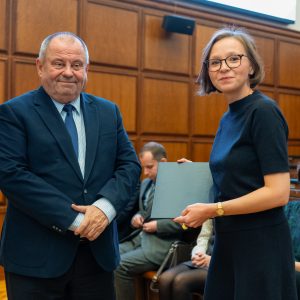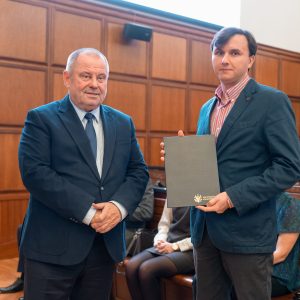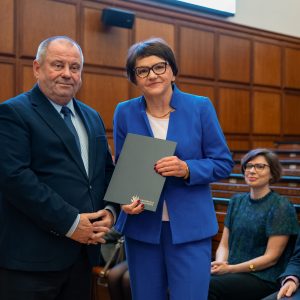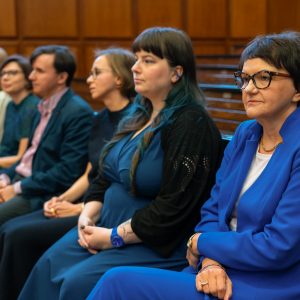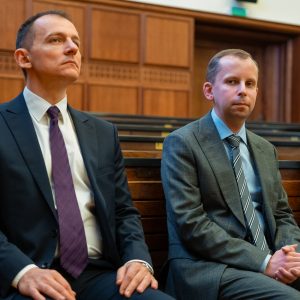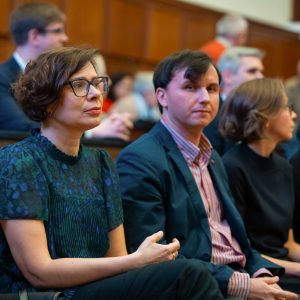School of Literary Translation Masters, exercises at the National Museum, engagement of students in geographical research projects, reforms of political science teaching programmes, and innovative methods of early school education. This year’s UW Rector’s Teaching Award went to five University employees.
On 19th November, the UW Rector’s Teaching Award was presented for the tenth time. It is awarded to academic teachers who have outstanding achievements in teaching and use innovative teaching methods. Their activities often go beyond the standard framework of education and also include popular science initiatives. Teachers shape universal competences among students, including critical thinking, cooperation, and creativity.
Candidates are nominated by deans and heads of academic departments. Nominations are evaluated by a committee chaired by the Vice-Rector for Student Affairs and Quality of Education. The committee includes representatives of students and doctoral candidates.
This year’s UW Rector’s Teaching Award was presented on 19th November during a ceremony at the Auditorium Maximum.
“I am proud that the University of Warsaw is made up of scientists who not only conduct excellent research, but also care about the highest quality of teaching. Today’s award winners prove that education can be both a mission and an interesting, inspiring adventure,” says Prof. Alojzy Z. Nowak, the UW Rector.
Winners:
- in the field of humanities:
ex aequo:
DR ALEKSANDRA JACKIEWICZ FROM THE FACULTY OF MODERN LANGUAGES
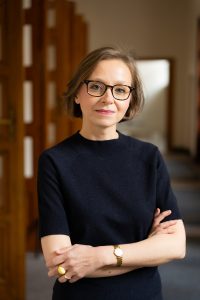
Her academic research focuses on the theory, practice and criticism of literary translation, particularly poetic translation, as well as comparative literature. Dr Jackiewicz also explores the issues of translation and the reception of 20th- and 21st-century Polish poetry in the Spanish- and Galician-speaking world.
In addition to her teaching work at the UW’s Institute of Iberian and Ibero-American Studies, she has for many years supervised students participating in international mobility programmes, serving as the Erasmus+ programme coordinator. She is also the deputy director for human resources and cooperation at the Institute, engaging in initiatives to develop scientific and academic cooperation. Dr Jackiewicz co-organises numerous educational and promotional projects, including the School of Literary Translation Masters, a project dedicated to improving translation skills. She actively participates in international projects and supports students and doctoral candidates undertaking internships abroad. The researcher is involved in improving the quality of education in the field of translation studies and in intercultural cooperation at the Faculty of Modern Languages, combining scientific and organisational work for the development of Iberian studies.
DR PAWEŁ NOWAKOWSKI FROM THE FACULTY OF HISTORY

The researcher specialises in late antiquity history and epigraphy, with particular emphasis on inscriptions related to the cult of saints and multilingualism in the provinces of the Roman Empire. He began his academic career as a doctoral candidate at the UW’s Department of Papyrology, where he defended his doctoral thesis in 2015. He carried out a project on epigraphic forms of the cult of saints in late antique Anatolia as part of a PRELUDIUM grant, and also received prestigious scholarships, including from the Foundation for Polish Science START and the Krupp Stiftung.
Between 2015 and 2018, he worked at the University of Oxford as a postdoctoral researcher on The Cult of Saints in Late Antiquity project, funded by the European Research Council. After returning to Poland, he joined the Department of Ancient History at the University of Warsaw, where he has been working as an assistant professor since 2019.
He currently heads the ERC STONE-MASTERS project, which aims to study stonemasonry workshops and changes in epigraphic culture in the late antique world. He is also carrying out a project analysing inscriptions from the early Byzantine Middle East in the context of the formation of social and cultural identities. Dr Nowakowski is the author of numerous publications, including the monograph Inscribing the Saints in Late Antique Anatolia, and his academic achievements have been recognised, among others, by a nomination for the “Polityka” Scientific Awards.
Dr Paweł Nowakowski regularly organises classes outside the lecture halls as part of ancient history exercises for first-cycle history and philology students, which take place in the Ancient Art Gallery at the National Museum using original material (mainly Latin inscriptions and Greek vases: inscriptions and paintings on vases) and in the Papyrology Library (history of the collection, reading manuscripts on Egyptian papyri). In conducting his classes, he uses teaching methods that develop skills such as creativity, critical thinking and problem solving among students. He is the project implementer – the main contractor for the implementation of the second-cycle programme “History of Ancient Mediterranean Civilisations” in English at the Faculty of History, as part of the IDUB grant Fields of Study in Priority Research Areas (second cycle), PRA IV: The Humanities: Crossing Borders, Extending Capabilities.
- in the field of exact and natural sciences, as well as in the field of medical sciences and health sciences:
DR MAKSYM ŁASZEWSKI FROM THE FACULTY OF GEOGRAPHY AND REGIONAL STUDIES
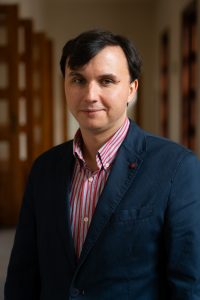
The researcher is a hydrologist specialising in natural and anthropogenic determinants of water quality, particularly in terms of the impact of urbanisation, agricultural activity and climate change on water sources and surface waters. He has conducted projects on the hydrology and hydrochemistry of the waters of Nowe Miasto nad Pilicą, Skarpa Warszawska (“Zielony UW” grant) and Mazovia (MINIATURA). In his research, he revives the memory of forgotten hydrotherapeutic health resorts in Warsaw and its surroundings, combining hydrology with history and the protection of natural and cultural heritage. He presents the results of his work at conferences, in museums and during open walks around Warsaw.
Dr Łaszewski is a highly regarded teacher who conducts classes in hydrology and oceanography, as well as hydrology modules of field classes. He makes the teaching of physical geography more attractive by involving students in scientific activities as part of student research projects. These projects allow students to develop their research skills and teamwork abilities, and their implementation results in joint scientific articles published in, among others, “Acta Geographica Lodziensia”, “Journal of Water and Land Development” and “Przegląd Geograficzny”. Dr Maksym Łaszewski is also involved in popularisation by cooperating with schools to organise field workshops and live lessons on surface and underground waters in Warsaw and the surrounding area.
- in the field of social sciences:
ex aequo:
PROF. WOJCIECH GAGATEK FROM THE FACULTY OF POLITICAL SCIENCES AND INTERNATIONAL STUDIES

The researcher is a graduate of the Institute of Political Sciences and the Faculty of Law and Administration at the University of Warsaw. He obtained his PhD in political and social sciences at the European University Institute in Florence, and his postdoctoral degree in political sciences in 2015. He currently works at the Department of Political Research Methodology at the UW’s Faculty of Political Science and International Studies, while also serving as the dean’s representative for strategy. Previously, he was associated with, among others, the UW’s Centre for Europe and the Institute of Political Science in Zurich as a SCIEX Fellow.
He is a member of the Scientific Council of Political Science and Administration. His research interests focus on the political system of the European Union, with particular emphasis on the functioning of the European Parliament, as well as issues related to democracy and political representation in the EU. He conducts research on political parties at the European level, comparative analysis of political systems, and social research methodology.
Prof. Gagatek teaches primarily in English-language political science programmes (first- and second-cycle) at the University of Warsaw, as well as at the UW’s Doctoral School of Social Sciences. He belongs to several national and international networks and scientific societies. He is the author of numerous expert opinions and reports prepared for national and EU institutions, including the European Commission and the European Parliament, which highlights the practical dimension of his research and expert activities. Three doctoral candidates have received NCN PRELUDIUM grants on the basis of their final theses prepared under his supervision. He is the author of an innovative Polish-German blended-learning project with intensive student exchange; he participated in the reform of the first-cycle programme in political science, and is also the initiator of a faculty competition for the best theses.
PROF. MAŁGORZATA ŻYTKO FROM THE FACULTY OF EDUCATION
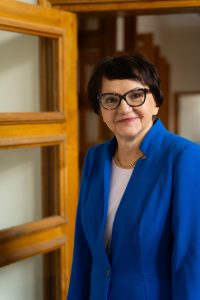
She is a researcher in early childhood education and teacher training. She specialises in the development of mathematical and language skills in children in the lower grades of primary school and in monitoring pupils’ achievements at school. Prof. Żytko conducts a variety of teaching activities, taking the initiative to create new, stimulating forms of teaching, including educational workshops using innovative methods of mathematics education. She is involved in international and national activities. She was an OECD expert on early education and co-coordinator of nationwide research monitoring the skills of pupils completing the first stage of primary school education.
Prof. Żytko actively participates in projects supporting teacher development, including the creation of innovative educational and training programmes, as well as postgraduate studies. At the Faculty of Education, Prof. Żytko is involved in activities supporting students and teachers, promoting active and exploratory methods of early school teaching. She is a member of the Association for Teacher Education in Europe and the Polish Pedagogical Society, as well as chair of the Scientific Council of the Edukacja na NOWO Foundation. She is also a member of the Warsaw Education Council. Prof. Żytko combines research with educational practice, and her teaching experience includes both domestic and international contexts.
As part of the UW’s Rector’s Teaching Award, honourable mentions were also awarded:
- in the field of humanities:
DR AGNIESZKA KOTWASIŃSKA FROM THE INSTITUTE OF AMERICAS AND EUROPE
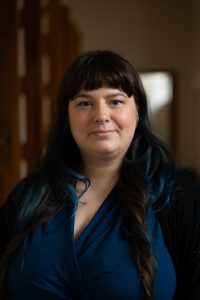
Her research focuses on American literature, particularly in the genres of horror and Gothic, as well as gender studies, queer theory, and feminist new materialism. Dr Kotwasińska teaches courses on American literature, horror, new media, and pop culture. She is the director of the Weird Fictions research lab and co-director of the Gender/Sexuality Research Group at the UW’s American Studies Center. She is the author of numerous academic publications, including articles in journals such as “Somatechnics” and the “Polish Journal of American Studies”, as well as chapters in books such as Monsters: A Companion, The Palgrave Handbook of Contemporary Gothic and Diffractive Reading. New Materialism, Theory, Critique. In 2023, her first monograph, House of Horrors: Familial Intimacies in Contemporary American Horror Fiction (University of Wales Press), was published. She is currently working on another book devoted to death and dying in modern horror cinema. Dr Kotwasińska received an IDUB grant for her research project “Śmierć ma znacznie: nowy aparat krytyczny w badaniach nad biomedyczną śmiercią w kinie grozy (ENG: Death matters: a new critical apparatus in research on biomedical death in horror cinema) [2022–2023].
PROF. MAGDALENA LUBAŃSKA FROM THE FACULTY OF CULTURE AND ARTS
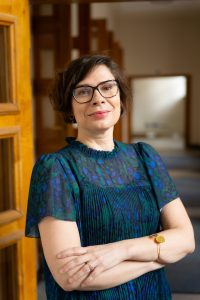
She works at the Department of Theory and Research of Contemporary Cultural Practices at the UW’s Institute of Ethnology and Cultural Anthropology. She specialises in the anthropology of religion, the anthropology of memory, and research on the relationship between religiosity and other spheres of life in local communities on cultural borders, conducting field research in Bulgaria or on the Polish-Ukrainian border. She also deals with religious (anti)syncretism, religious materiality, and post-secular thought. She teaches on Orthodox iconography, cultural theory, anthropology of evil, secularisation and post-secularism, as well as ethnographic laboratories devoted to the memory of war and post-war in the Podkarpacie region at first-, second-, and third-cycle studies courses. She is the supervisor of numerous academic works, which have been reflected in her students’ publications, including the book Kruche życia po obu stronach Sanu. Wspomnienia ostatniego pokolenia świadków II wojny światowej i powojnia.
- in the field of exact and natural sciences, as well as in the field of medical sciences and health sciences:
DR KLAUDIA DĘBIEC-ANDRZEJEWSKA FROM THE FACULTY OF BIOLOGY
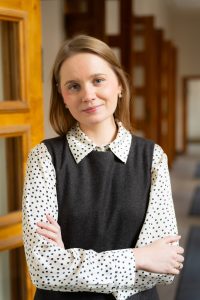
She is a researcher in environmental microbiology and biotechnology. She specialises in soil microbiology, bacteria-plant interactions, and technologies related to the regeneration of agricultural and industrial soils and plant biofortification. Dr Dębiec-Andrzejewska teaches classes that combine theoretical knowledge with research experience, engaging students in practical projects and scientific research. The scientist manages and participates in national and international research projects and scientific internships, e.g. in Italy, and her activities also include the commercialisation of research results – she is the co-founder and president of the UW’s spin-off company BHUMI, which develops innovative microbiological preparations for regenerative agriculture and industry.
- in the field of social sciences:
PROF. JACEK LEWKOWICZ FROM THE FACULTY OF ECONOMIC SCIENCES
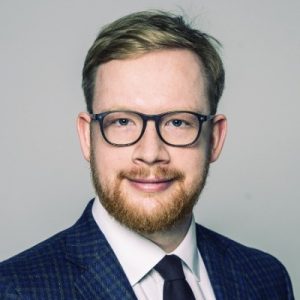
He is an expert in institutional economics, economic analysis of law and political economy. He has a background in economics and law and specialises in studying institutions as structures of norms and rules that shape decisions, using advanced quantitative tools, including econometric models, automated text analysis and machine learning methods. Prof. Lewkowicz teaches courses in political economy, unsupervised machine learning, text data exploration, and diploma seminars, engaging students in projects and research. The scientist is engaged in national and international activities. His research projects concern, among others, populism, institutional stability and the impact of regulation on the functioning of democratic systems. In 2024, Prof. Lewkowicz won the “Polityka” Scientific Awards in the “social sciences” category.
DR RAFAŁ WOŹNIAK FROM THE FACULTY OF ECONOMIC SCIENCES
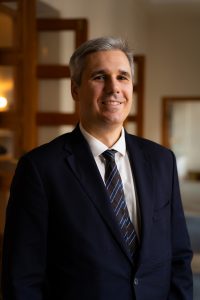
He is an assistant professor at the Department of Statistics and Econometrics and is associated with the Centre for Chinese Studies. In his research, he uses a wide range of econometric models, with a particular focus on panel data models and methods of dealing with endogeneity. He is also interested in the use of multi-equation panel models, which allow for the simultaneous description of multiple economic phenomena. Dr Woźniak’s research interests include business cycles, health economics, microeconomics and economic analysis of law. He teaches applied econometrics and data analysis, engaging students in the practical use of panel models and advanced methods. He is a co-founder and co-organiser of the Warsaw Econometric Challenge, an international competition for students.
